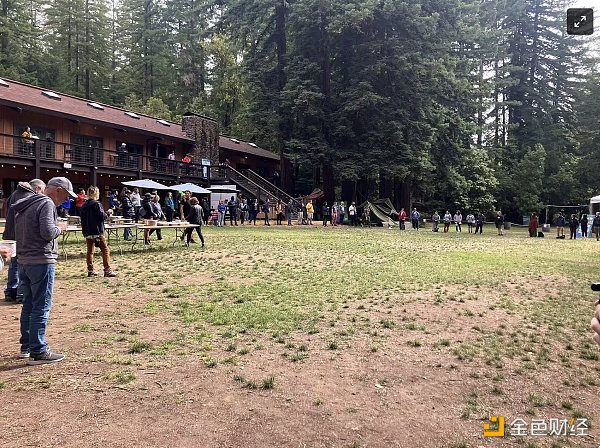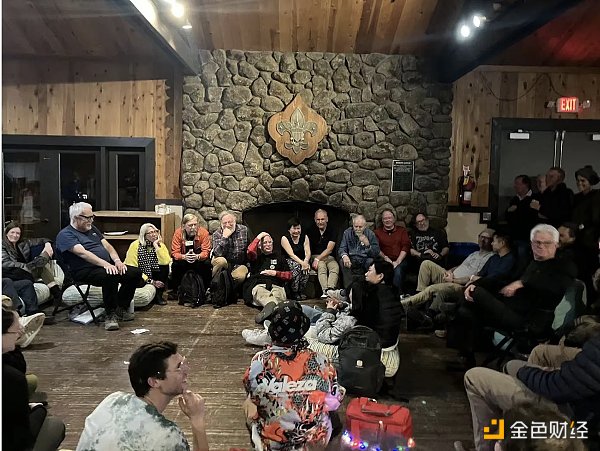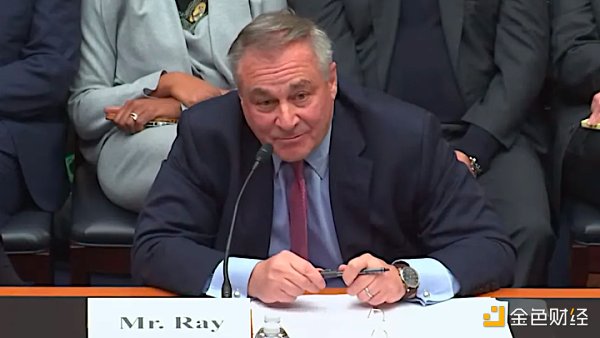DWeb Camp Experience and Impressions
DWeb Camp Experience # Introduction I attended DWeb Camp, a three-day event focused on decentralized web technologies and culture. Here are my thoughts on the experience. ## Day One I attended talks and workshops about peer-to-peer networking, distributed data storage, and blockchain-based identity. ## Day Two Day two was focused on hacking and collaboration. I worked with a team to create a decentralized social network using blockchain and IPFS technologies. ## Day Three The final day was for sharing and reflection. Attendees shared projects and experiences, and reflected on what they learned. # Conclusion DWeb Camp was a valuable experience to learn about decentralized web technologies and culture and connect with others who share a passion for building an open, resilient, and equitable web.There are a lot of activities such as poetry, music, handicrafts, dance, yoga, and tai chi in the camp, which reflects humanistic care everywhere. Many people come with their partners and children, turning it into a family outing. There are also many middle-aged and elderly people, many of whom are early participants and pioneers of the Internet. The age span of the participants is very large. Tim Berners-Lee, the father of the World Wide Web, is also here this time, having in-depth exchanges with many people, listening to sharing and asking questions very seriously. The old man is still learning. There is also an excellent classical music volunteer team that plays the violin and performs at every meeting. The beautiful music echoes in the woods, bringing us great joy. The level is not inferior to that of a formal symphony orchestra. Moreover, in such a beautiful environment, it is like a natural sound. One night, the activity was to go to the mountain to watch the stars, but unfortunately the weather was not good, it was a big cloudy day. The band played improvisational music, and we lay on the lawn, closed our eyes, and became a night music concert, extremely intoxicated.

(Happy Camp)
Friends who come to attend the meeting find that there is generally a skeptical and critical attitude towards blockchain and cryptocurrency here, which actually provides another perspective on the future of the Internet. He randomly asked some developers about their views on blockchain, and I listened to it next to him. Jackson, a developer of Solid, said that there are too many bubbles in the blockchain field, which affects people’s understanding of decentralized technology; ICO itself is not ethical, and has not protected ordinary people, causing a lot of losses. Moreover, many times web3 is not the best solution. Not everything needs to be on the chain, consensus, and financialization are needed. It is only a part of the entire technical architecture blueprint. These things he said also caused us to reflect on how to enhance the utility of Web3, how to solve real problems for people, and what needs to be put on the chain and what does not. When we were chatting, Tim Bernes-Lee walked to a piano next to him and played it without permission, becoming our accompaniment, alone and intoxicated. A man who helped connect the world and shared this technology with the world for free is still shouting for the future of the network, fighting alone, and immersed in a dream that has lasted for decades.
- Binance Launchpool will list Pendle
- How to initiate the NFT era with ERC-6551?
- IOSG Ventures: Network effects of Web3 game engines
After the end of DWeb Camp, I participated in an online conference of the CRDT community, where many people shared their experiences of attending the conference, saying that there are few places where it is so easy to say hi and see others doing similar things, feeling that they have gained many allies. Someone said, “We see the same mountain, but climb in different ways.” This is an impressive aspect of the DWeb community, which is a shared community where everyone learns from each other. Listening and sharing are equally important, and there is no need to “perform” or grab everyone’s attention. Even if you are interested in a niche technology (such as OCap, ActivityPub), there are people here to discuss it with you, and you will find that you are not alone.
When chatting with Doc Searls of Harvard University’s Berkman Klein Center, I shared a long-standing niche idea of mine called “User Side Intelligence.” When using Internet services, those recommendation algorithms and applications provide me with information and services, but not necessarily for my purposes. For example, YouTube recommends videos that make me want to watch, want to watch again, and want to watch more, and the core is still to serve the platform, grab my attention, and make me consume and indulge. The boss is still the platform. A product or service will generate user-side value and platform-side value, which are often inconsistent. I hope there is a software or intelligent agent that can represent my values, communicate with different platforms, services, and data sources, and comprehensively recommend content that meets my needs, like my broker. This User Side Intelligence must have my values as its purpose, and I can also provide personalized data for it, following the development of my personal life. My idea has something in common with what Doc is doing with Customer Commons.

(Conversation with Internet pioneers, with Tim Berners-Lee in the middle)
DWeb Camp focuses on people and the impact of technology on people. We are doing our own decentralized social protocol, Social Layer, which emphasizes subjectivity, that is, the subjectivity of people. Social here is not about socializing in the sense of Web2, but about how people trust and collaborate with each other. People must be placed at the center, as both active subjects and bearers of technological influence. On the one hand, we need to expand the boundaries of technology, and on the other hand, explore how technology can serve people. The exploration of Social Layer will not be limited to Web3, but can also be Web2, DWeb, and offline life, and “openness, collaboration, and people-centeredness” are the key words that remain unchanged. Social Layer also refers to the social level. For Web3, there are many aspects, and Data Layer and Incentive Layer are important, and Social Layer is also important, but still far from being explored.
DWeb Camp has a unique cultural slogan: JOMO (Joy Of Missing Out). In contrast to the FOMO (Fear Of Missing Out) culture, in such a rich and diverse event, while getting interesting things, it is inevitable to miss other wonderful things, and to regard such misses as part of the fun and enjoy the moment. The schedule is also relatively loose, which makes people not feel socially exhausted.
The core theme of this DWeb Camp is Tomorrow, which brings together pioneers, builders and innovators of the internet, as well as children, to imagine the future of the internet together. Through technological innovation, as well as our unity and wisdom, can we fix existing problems? At the closing ceremony, a pair of nine and thirteen-year-old brothers read poetry on stage, sharing their vision of Tomorrow, which includes social inequality, climate change, and the impact of AI. So can we create a better internet and promise ourselves a better future?
We will continue to update Blocking; if you have any questions or suggestions, please contact us!
Was this article helpful?
93 out of 132 found this helpful
Related articles
- In-depth explanation of the ERC6551 token binding account protocol, which has recently gained popularity
- Gemini co-founder publishes open letter condemning DCG founder: “Scammer, return the money, or face legal action from both DCG and me.”
- Foresight Ventures: Can Asgard NFT AMM build a new rainbow bridge?
- Decentralized Broker or Protocol? Analyzing the Two Paths to Build the Foundation of DeFi
- Field Investigation: The Darkest Hour Has Not Come, But NFT Will Not Die
- Interpreting the Latest Feature of Mirror – Collectable Embeds: Display, Spread, and Interact
- Decoding RWA: The Most Valuable Encryption Narrative in Compliance Context




